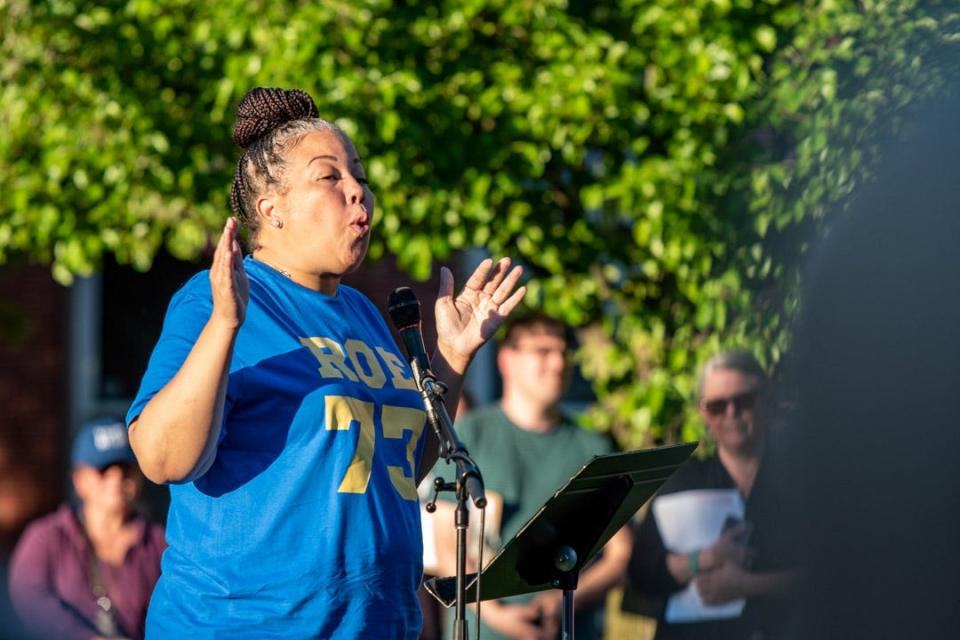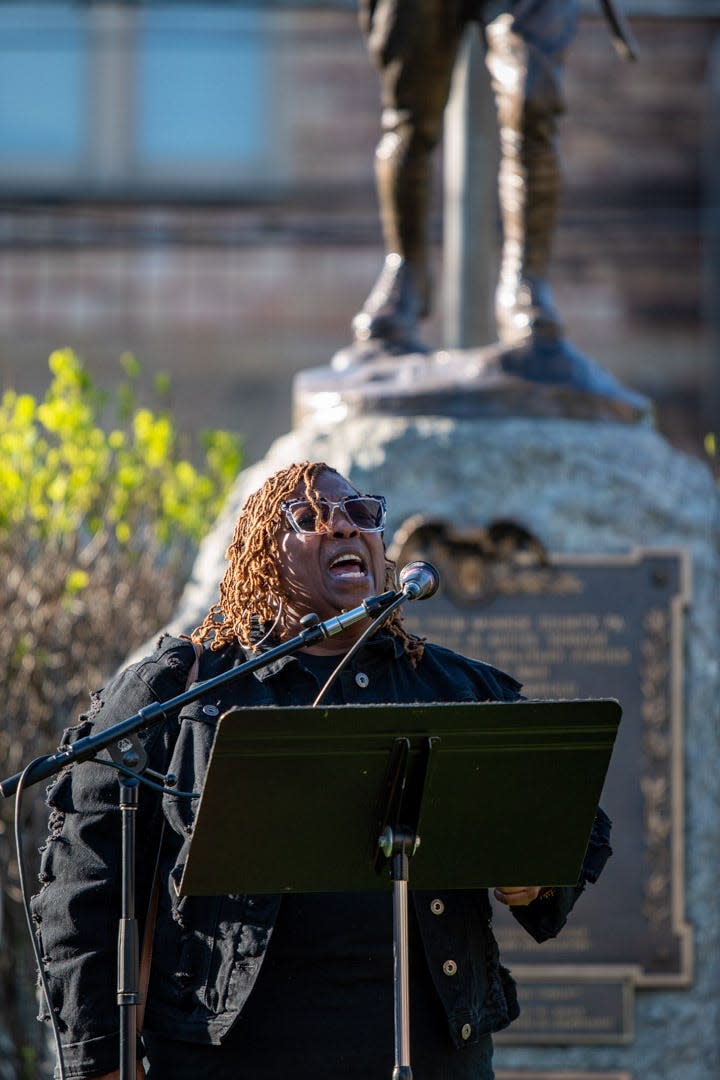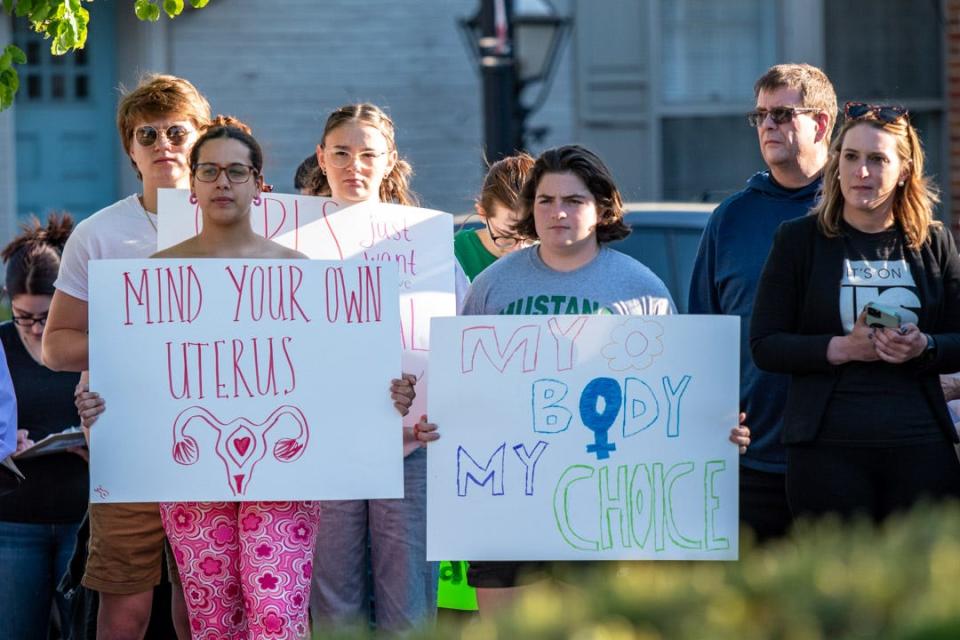Roe v. Wade overturned: Communities in Poconos contend with lack of abortion access

Editor's note: The United States Supreme Court overturned Roe v. Wade in a decision announced Friday, June 24, 2022.
On a warm spring evening in Stroudsburg's Courthouse Square, Pastor Selena Brown of Greater Shiloh Church thanked God for the opportunity "to discuss what is necessary."
"Lord God, we honor you, even in this space. And even in this time, we honor your name ..." She said. "God, keep us together in love.
On May 9, dozens of citizens championing abortion access, along with a string of speakers including elected officials and those running for office, came together to raise further awareness of the looming issue at hand.
Leading the event, while wearing a T-shirt emblazoned with the words "Roe 73," Christa Caceres, president of NAACP's Monroe County Branch #2275, told the crowd "our country needs to remain true to its ideals from our Pledge of Allegiance: liberty and justice for all."
"Roe v. Wade was decided by the US Supreme Court in 1973, when I was just 2 years old. I'm now 51, and I'm horrified that we are once again faced with the erosion of human rights, that women and men across this country fought for," Caceres said. "The work of so many brave women before me will not be lost to the patriarchy. We will uphold liberty and equality for women in America. And it starts right here in Stroudsburg, Pennsylvania."
Of interest:Leaders from Poconos react to Roe v. Wade draft ruling leaked to Politico
Following the leak of an opinion overturning the decisions made in Roe v. Wade, women's health agencies and advocates across the Poconos have stood up rapidly to defend a right to choose whether or not to carry a pregnancy to term. Being that the legendary court case is not codified as law in Pennsylvania, if that decision is undone, abortion access could be limited.
There have been numerous attempts to limit access to abortion care in Pennsylvania, including a 2017 bill vetoed by Governor Tom Wolf, who called it the "most extreme anti-choice legislation in the country."

Shock and surprise dictated the most common responses to the announcement that on May 2, Politico had obtained a U.S. Supreme Court draft opinion that would essentially overturn the landmark Roe v. Wade case of 1973 that has set the precedent for abortion rights in the United States.
Naturally, those in support or opposition of the decision penned by Associate Justice Samuel Alito and signed by a majority of the justices are standing up to fight for or against the right to abortions. At the moment, the decision is not yet final, and experts have speculated that it will take at least a few months for an official decision.
'Banning safe abortions'
According to Lauren Peterson, MPA, executive director of Women's Resources of Monroe County, Inc., removing the federal protection for abortion access ultimately would do more harm than good, "disproportionately affecting people of color — women who maybe have less income to be able to afford good medical care." And ultimately, she says, lives will still be at risk.
"I don't think abortions weren't happening before Roe v. Wade. They just weren't safe. Women were dying. You're not going to ban abortions, you are banning safe abortions," Peterson said.
Caceres agreed those groups would suffer if and when a decision comes down to overturn Roe v. Wade.
"The abortion rate is slightly higher for women of color. There are cultural reasons for that; there are economic reasons for that, and this will only exacerbate further exacerbate the problem," Caceres said. "I think that also when you look at the the death rate during childbirth, for Black women, there are just so many areas where this poses extreme danger for women in my community and other communities of color that are not being considered."
Centers for Disease Control data shows that Black, American Indian and Alaska Native women can be two to three times more likely to die from pregnancy-related causes than white women, with Black women up to four to five times more likely to die from a pregnancy-related condition.
But the risk isn't limited to racial demographics — both Peterson and Caceres noted that those who fall into lower socioeconomic categories also will be endangered.
Caceres in particular noted the Hyde Amendment, a 1976 rider attached to the Congressional appropriations bill for the Department of Health and Human Services that has been renewed annually for over four and a half decades, as a sign of government eroding abortion access in a calculated fashion.
The Hyde Amendment essentially blocks federal funding for abortions, with limited exceptions for rape, incest and cases in which the pregnancy would endanger the mother's life, more or less limiting abortion coverage to those with private insurance. Though the amendment originally was reduced by a Republican, Democrats have allowed it to continue — despite their wishes that it be eliminated— often due to claims that spending bills, which Hyde is linked to, require bipartisan support to pass.
Over the years, Caceres added, legislators and other politicians have reinforced limitations on when women can have abortions and, established numerous "trigger laws" that would essentially ban abortions on a state level once Roe v. Wade is overturned. While there are no such measures in Pennsylvania, changes in the political landscape come fall could remove the failsafe of Gov. Wolf's veto power if the General Assembly attempts to introduce anti-abortion legislation. Pennsylvania also will elect a new governor in November.
"We see these baby steps, you know, toward curtailing or terminating abortions, and it will have a very significant impact on not just people of color, but the poor," Caceres said. "There are poor white people as well who will be impacted by this decision. And I feel like once again, you know, the wealthy will be fine, the poor and the middle class will be left holding the bag, even in this case."
Related:If Roe v. Wade is overturned, here's how abortion laws in each state will stand
Peterson noted that further limitations on abortion rights would be especially problematic for the individuals whom she and her colleagues see on a regular basis.
"The people that we serve being domestic and sexual violence victims, I think it will very directly impact their lives. If there is a rape that occurs or reproductive coercion in a domestic abuse relationship, that victim will essentially be forced to carry their abuser's child, the fetus, to term and give birth to it, whereas under the current law, they would have that ability to terminate the pregnancy." Peterson said.
While the commonwealth's total population is approximately 12% Black, abortions for Black individuals were nearly equitable with whites, which constitute 81.6% of the population. This disparity is intrinsically linked with several factors related to healthcare quality and access for minorities and the poor.
Centers for Disease Control and Prevention data shows that white women saw about 13 pregnancy-related deaths per 100,000 live births, known as pregnancy-related mortality ratios (PRMR), whereas American Indian and Alaska Native women saw 30, and Black women experienced 41.
A 2019 report states that "Even in states with the lowest PRMR and among groups with higher levels of education, significant disparities persisted, demonstrating that the disparity in pregnancy-related mortality for Black and (American Indian/Alaska Native) women is a complex national problem."
The CDC notes that access to care, quality of care, and prevalence of chronic diseases play important roles when it comes to a viable pregnancy. In cases where consistent and quality healthcare for the woman and fetus is unavailable or out of reach — which also may affect those in lower income classes as well — and conditions such as hypertension tend to affect Black individuals more often, abortion may be one of the few answers to ensure the safety of the pregnant person.
Lack of access to care in the Poconos
Abortion rights advocates have continuously argued that overturning Roe v. Wade would result in the return to illegal abortions, which easily could lead to emergency complications and even death, a scenario reminiscent of the days prior to the Supreme Court's 1973 decision.
According to the U.S. Census Bureau, as of 2021, 10.9% of Pennsylvanians are in poverty. Local levels hover around this figure, with Monroe reporting 10.5%, Pike reporting 9.3%, Wayne reporting 10.5%, Carbon reporting 11.3%, and Lackawanna reporting 12.2%.
Limited options for care in the northeast part of the commonwealth mean that even now, residents of the Poconos often travel outside the region for reproductive care— and if they intend to terminate the pregnancy, there is no other choice.
The Pennsylvania Department of Health's 2020 Annual Abortion Report noted that only 14 Pennsylvania counties performed abortion services that year, and only three of those counties— Lehigh, Luzerne, and Northampton— are located in close proximity to the Poconos.
Monroe County progressive Kristina Ramanauskas hit a chord with the rally crowd calling attention to the lack of providers in rural counties, including a significant majority of Pennsylvania, and calling out the possible overturn of Roe v. Wade as a decision "steeped in hypocrisy" when it comes to access to care.
"Currently, in rural counties United States, there are only 3% that have at least one abortion provider. That's the entire country. Who does this affect? This affects the marginalized, the impoverished. Wealthy women will always find a way — those senators, girlfriends and mistresses will always find a way to get an abortion," Ramanauskas said.
Speaking at Monday's rally, Monroe NAACP member Kelly Hunter spoke on the undue financial burden that women often bear when they must sacrifice work and income to care for children, in addition to the overwhelming cost and overall lack of childcare available to those women.
"So instead of focusing on regulating women's bodies, and our right to choose, let's place greater emphasis on creating access to safe and affordable childcare, eradicating contraceptive deserts, moving women and children out of the cycle of generational poverty, and making sure that the men in these relationships step up to be husbands and fathers," Hunter said. "Because being a mommy is a whole lot easier when you have the resources to mommy."
Tameko Patterson, vice president of the Monroe County NAACP and former Stroudsburg Area School District board member, focused her time at the recent rally in Stroudsburg on how eliminating the option for abortion easily could put both women and children in severe financial peril.

Patterson noted that there are nearly half a million children in foster care across the country — Adoption and Foster Care Analysis and Reporting System's fiscal year 2020 data shows the number to be 407,493 as of 2020 — asking the crowd to "imagine how that number will be significantly reduced if the mother had an abortion instead of giving birth to a child she didn't want or couldn't afford to raise."
"More than 600,000 children have been victims of maltreatment. Imagine how that number will be significantly reduced if the mother had had an abortion, instead of giving birth to an unwanted child. More than 16 million children belong to families who collect public assistance," Patterson said. "Many women choose abortion and don't have the financial resources to support a child. Forty-two percent of women having abortions are below the federal poverty level. Imagine how this burden was to be lifted from the government and taxpayers if the mother had an abortion instead of giving birth to a child she couldn't afford to raise."
Tracey Vitchers, executive director of It's On Us, a grassroots campaign to end sexual assault on college campuses, made note of the disparities between guaranteed rights for men and women, calling upon a unified front to help in the fight for reproductive rights, stating "your ability to be silent on this issue is a privilege that the rest of us frankly do not have."
"When more than 50% of the citizens of this country are on the brink of being denied the basic human right of bodily autonomy," Vitchers said. "There is no such thing as freedom for all in this country. We need you speaking out, standing up, and men, you need to start putting your bodies on the line to stop these attacks."
On their organization's website, It's On Us notes that between 20% to 25% of undergraduate women are victims of sexual violence, though 90% or more do not report the violence.
"No person should be forced to carry any unwanted pregnancy to term, and particularly those who become pregnant because of sexual violence," Vitchers said. "I dare Justice Alito to look a 19-year-old rape survivor in the eye and tell her that she must carry to term a pregnancy forced upon her by her rapist. The immense cruelty that will be wrought upon the women of this country if Roe falls is unfathomable, and it will take all of us, including the men here tonight, fighting back to stop it."
Resource center steps up for parents, regardless of choice
Tucked away in a small office just off of Main Street in Stroudsburg, Pregnancy Resource Center of the Poconos appears rather unassuming. But the facility has been responsible for years of free public outreach and assistance for pregnant women, mothers and fathers since it came into being nearly four decades ago.
Executive Director Alice Marchesani is not shy about her personal stance on the Roe v. Wade issue — she characterizes herself as "pro-life"— though her organization does provide pregnancy decision counseling, which she notes does not in any way influence the patient to either obtain an abortion or decide otherwise.
"We're based on abiding by the law, and it's important that they make their own decision," Marchesani said.
Marchesani said the key point of PRC's service is to sit down and truly listen to what the individual in question wants and needs in her life, even if that does end in an abortion.
Marchesani said "many women have several areas in the life that are a challenge," and that relationship-based issues are a prime motivator for those seeking abortion.
"The relationship with the father of the baby is shaky, either a lack of commitment and then a financial aspect, an economic aspect. And oftentimes, it's a combination of both. They vary from all different ages. There's not one mom that's come here that's the same," Marchesani said.
Local opinionMonroe County United: We must want change to achieve it | Thomas Jones
And while the majority of clients opt to carry on with their pregnancy, Marchesani said PRC remains open to all — even if they already have gone through with an abortion.
"We've even had women that have come in, had an ultrasound and terminated their pregnancy and call us and say they need to talk to someone. And guess what we do? We talk to them. And we don't shame them. These are our services; we serve indiscriminately." Marchesani said.
The difference with PRC comes in their particular methodology, offering myriad assistance options for pregnant people and families, including free supplies, testing, ultrasounds, social service referrals and more. In a time when necessary items like diapers and formula — and even more costly items like car seats — can be hard to find or far too expensive, PRC is a lifeline for mothers in need.
According to Marchesani, this extended support system creates a lasting bond with the people they treat.
"If a woman is with us from the moment of her pregnancy till their baby's 2 years old, now we have a relationship and they come once a week. They're not clients anymore, they're family to us. They truly are," Marchesani said.
While the country awaits a final decision for Roe v. Wade, opinions remain split in the Poconos.
To those fighting for access to abortion services, the question is not one of morality, but of freedom.
"I hate the fact that any woman would ever have to undergo it, but we must, must, must, must give the women the freedom to make their own decisions," Caceres said.
This article originally appeared on Pocono Record: In the Poconos, a community contends with lack of access to abortion

